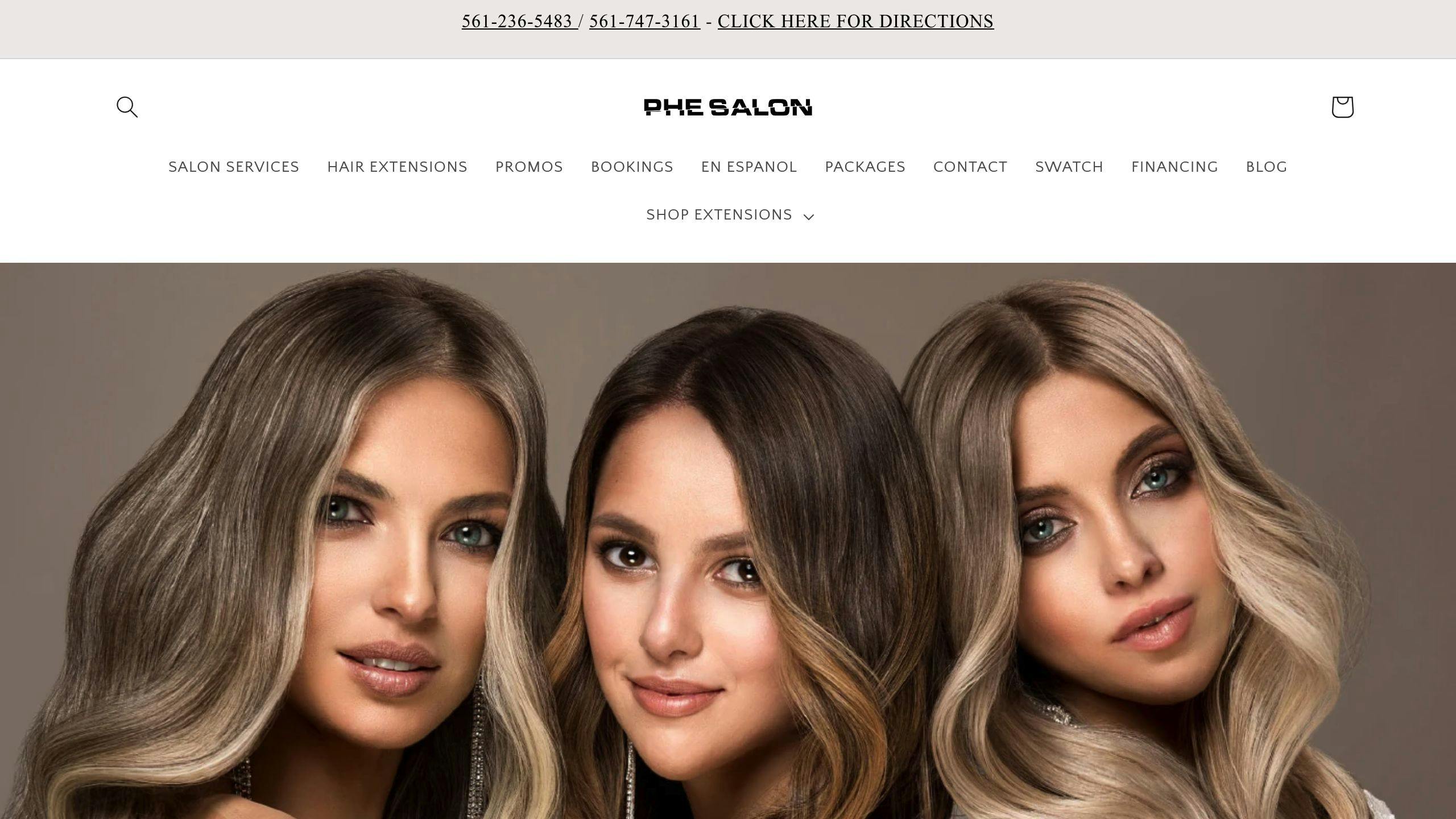Hair extensions can enhance your look, but they might lead to hair loss if not applied or cared for properly. Key issues include tension on hair follicles, harsh adhesives, improper handling, and allergic reactions. Early signs of damage include broken hair, thinning hairlines, bald spots, or scalp irritation. To prevent hair loss:
- Choose lightweight, high-quality extensions.
- Rely on professional application and removal.
- Follow a strict maintenance schedule.
- Care for your hair and scalp daily.
If you notice persistent issues, consult a professional immediately to avoid long-term damage.
How to prevent hair damage from a weave or extensions
Ways Hair Extensions Can Lead to Hair Loss
Hair extensions can harm your natural hair in several ways. Knowing these risks can help you take precautions and avoid long-term damage.
Hair Loss from Tension and Pulling
Excessive tension on hair follicles, known as traction alopecia, is a frequent issue with extensions. Extensions that are too heavy or applied too tightly can strain the follicles, especially when worn for extended periods or unevenly distributed [1].
Damage from Chemicals and Adhesives
The adhesives and bonding agents used for extensions often contain harsh chemicals that can harm your hair [1][3]. These chemicals may:
- Dry out the hair shafts
- Weaken the hair’s protein structure
- Irritate the scalp
- Interfere with natural hair growth
Repeated applications without giving your hair a break can make the damage worse over time.
Problems with Application or Removal
Poor techniques during installation or removal can lead to both immediate and long-term harm [1][2]. Here are some common issues:
| Issue | Potential Damage |
|---|---|
| Tight braiding | Breakage at the roots |
| Aggressive removal | Hair breakage |
| Incorrect placement | Uneven tension on hair |
| Skipping proper prep | Weak or unstable attachments |
Allergic Reactions to Extension Materials
Some people may experience allergic reactions to the materials used in extensions [1][3]. These reactions can cause scalp inflammation, which might result in hair loss over time.
Recognizing these risks early can help you minimize damage and protect your natural hair. Next, we’ll look at the warning signs to watch for.
Signs Your Extensions Are Causing Hair Loss
Noticing hair damage early can help you avoid long-term problems. Here are some signs to look out for:
Broken Hair Around the Hairline
If you see short, broken, or frayed strands near your temples or forehead, it could be a sign that your extensions are causing damage.
Thinning or Receding Hairline
Hair looking less dense or appearing patchy at the temples or frontal edges often signals a thinning or receding hairline. A wider natural part can also point to stress-related hair loss.
Bald Spots or Thin Patches
Watch for bald spots, thinning areas, or circular patches, especially near extension attachment points. These areas might show reduced hair density.
Scalp Pain or Irritation
Discomfort like scalp pain, redness, itching, or burning near extension bonds could be a red flag for damage caused by extensions.
If you notice any of these issues, consult a professional to evaluate the situation and discuss possible solutions. Catching these signs early can make a big difference, but taking steps to avoid damage from the start is even better.
sbb-itb-4220d4e
How to Prevent Hair Loss from Extensions
Choose the Right Extensions
Opt for lightweight, high-quality extensions like human organic or Remy hair. These put less pressure on your scalp and hair, making them a better choice if your natural hair is fine or fragile. Plus, they provide a natural appearance while being gentler on your hair follicles.
Rely on Professional Application and Removal
Getting your extensions applied and removed by a professional is crucial. DIY attempts can cause uneven tension, breakage, or even long-term damage. A skilled stylist will not only ensure proper installation but also assess your hair's condition and recommend the best method for you.
To keep both your extensions and natural hair in good shape, stick to a maintenance schedule:
| Care Step | Suggested Frequency |
|---|---|
| Installation | Every 8-10 weeks |
| Check-ups | Every 4-6 weeks |
| Removal or Break | Every 3-4 months |
| Adjustments | Every 2-3 weeks |
Care for Your Hair and Scalp
Daily care is key to maintaining your extensions and protecting your natural hair. Use sulfate-free shampoos and conditioners made specifically for extensions. Incorporate these habits into your routine:
- Brush gently, starting from the tips and moving up to the roots.
- Limit exposure to high heat.
- Keep bonds separated to avoid tangling or matting.
- Clean your scalp carefully without disturbing the bonds.
"Regular maintenance and adjustments by a professional can help prevent hair loss. Early intervention and proper care can help prevent permanent hair loss", says hair extension experts [3].
If you notice any issues despite following these steps, consult a professional to address them before they worsen.
When to Get Professional Help
Sometimes, even with the best care, certain problems need a professional's touch to prevent lasting damage. If early warning signs persist despite your efforts, it’s time to seek expert advice.
Here are some clear signs that you should consult a professional:
| Warning Sign | What to Do |
|---|---|
| Persistent Pain | See a stylist if discomfort lasts more than 48 hours. |
| Progressive Thinning | Book an evaluation within a week. |
| Unusual Hair Loss | Get immediate help if shedding seems excessive. |
| Ongoing Irritation | Same-day consultation for severe reactions. |
A professional stylist can assess these issues and suggest solutions, such as adjusting the placement of extensions or offering alternatives that better suit your hair type. Research shows that while nearly 40% of extension users face some hair loss, timely professional care can reduce these risks significantly [1][2].
Services at PHE Salon in Jupiter, Florida

PHE Salon in Jupiter, Florida, provides free consultations to evaluate extension compatibility and address any hair concerns. They offer a range of services, including custom organic or Remy hair extensions, along with treatments like Japanese scalp massages to promote scalp health and hair growth. Regular maintenance appointments every 4-6 weeks ensure that professionals can track your hair’s condition and update your care routine if needed.
Don’t let small problems turn into big ones - expert guidance can help you maintain healthy natural hair while enjoying the perks of extensions [3].
Conclusion
Hair extensions can transform your look, but if not managed properly, they might harm your natural hair. One key issue to watch for is traction alopecia, which can occur when hair follicles are under constant tension. If caught early, the damage can often be reversed, but ignoring the signs may lead to lasting problems [1][2].
Heavy extensions can put unnecessary strain on your hair, making professional application and care essential. To protect your natural hair, consider these steps:
- Opt for lightweight extensions to reduce tension and ensure they are applied and removed by a professional.
- Keep your scalp clean and healthy.
- Take breaks from wearing extensions to give your hair a rest.
If you experience ongoing discomfort, thinning, or unusual hair loss, consult a professional immediately. Regular maintenance appointments every 4-6 weeks are also important. These visits allow experts to assess your hair's condition and make any necessary adjustments to your care routine.
Healthy hair with extensions is achievable when you stay attentive and seek professional guidance. Salons like PHE Salon in Jupiter, Florida, offer expert care and personalized solutions, helping you enjoy the benefits of extensions while keeping your natural hair in great shape.
FAQs
Will hair loss from extensions grow back?
In many cases, hair loss caused by extensions can be reversed if addressed early. Reducing tension and taking proper care of your scalp are key steps. However, if the hair follicles experience prolonged stress, it could lead to permanent issues like traction alopecia [1].
Can hair extensions ruin your hair?
Hair extensions can cause damage if they are too heavy or not applied correctly. To lower the risk, opt for lightweight extensions (especially if you have fine hair) and have them installed and maintained by a professional [2].
Seeking expert advice and keeping up with regular maintenance are the best ways to protect your natural hair.

